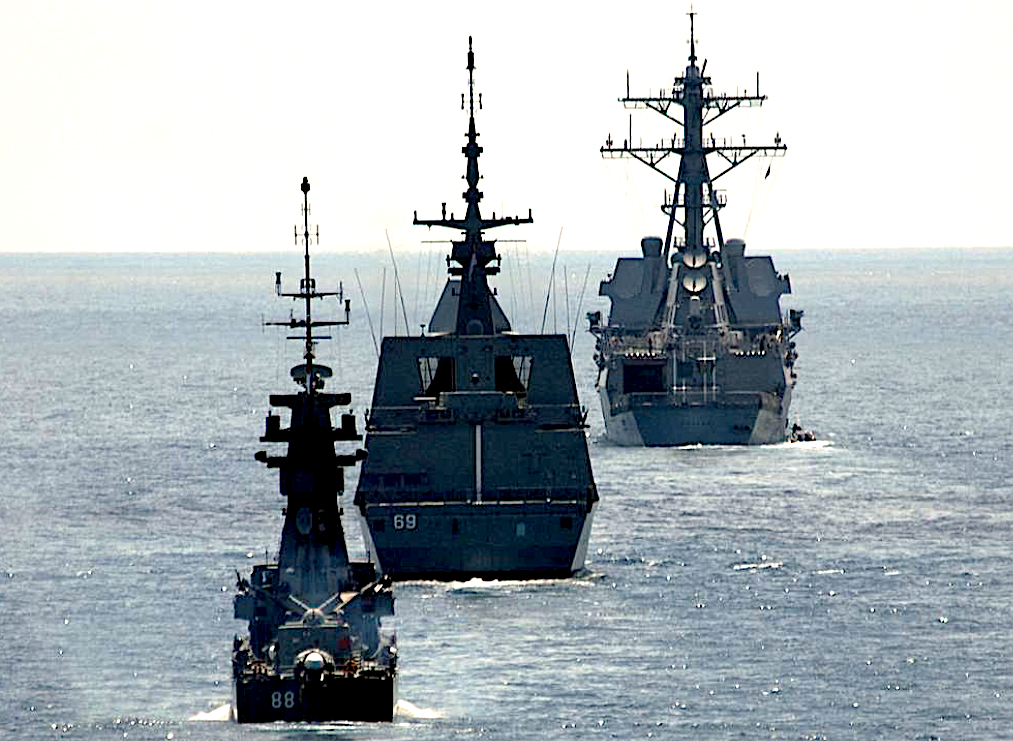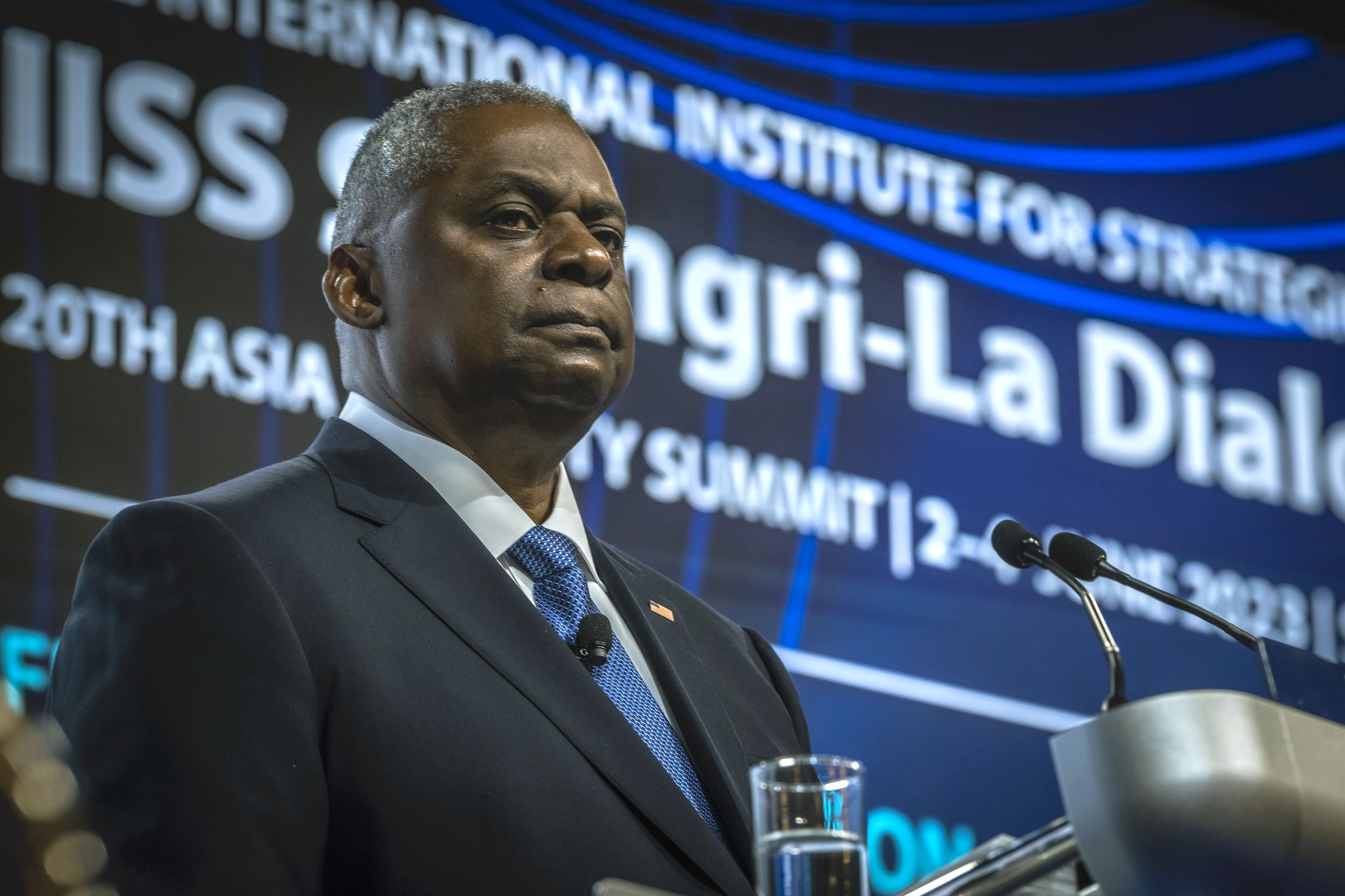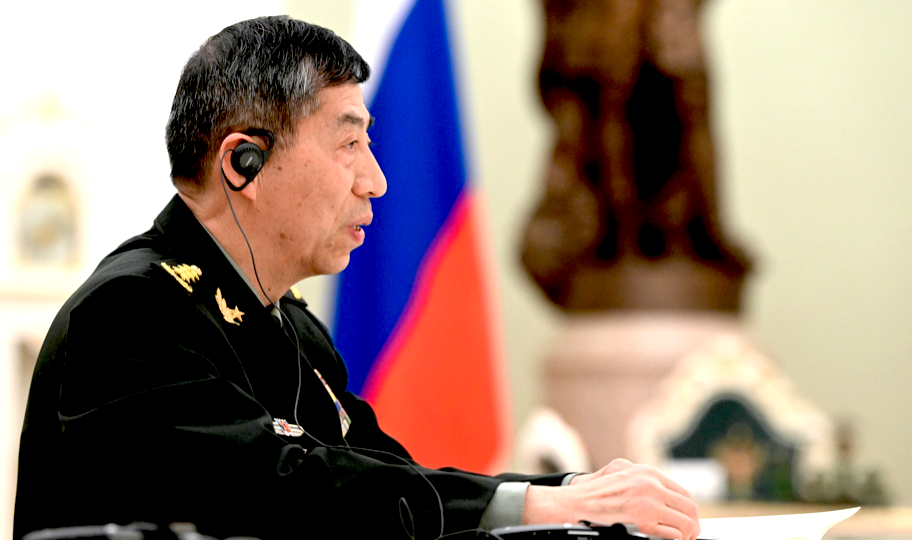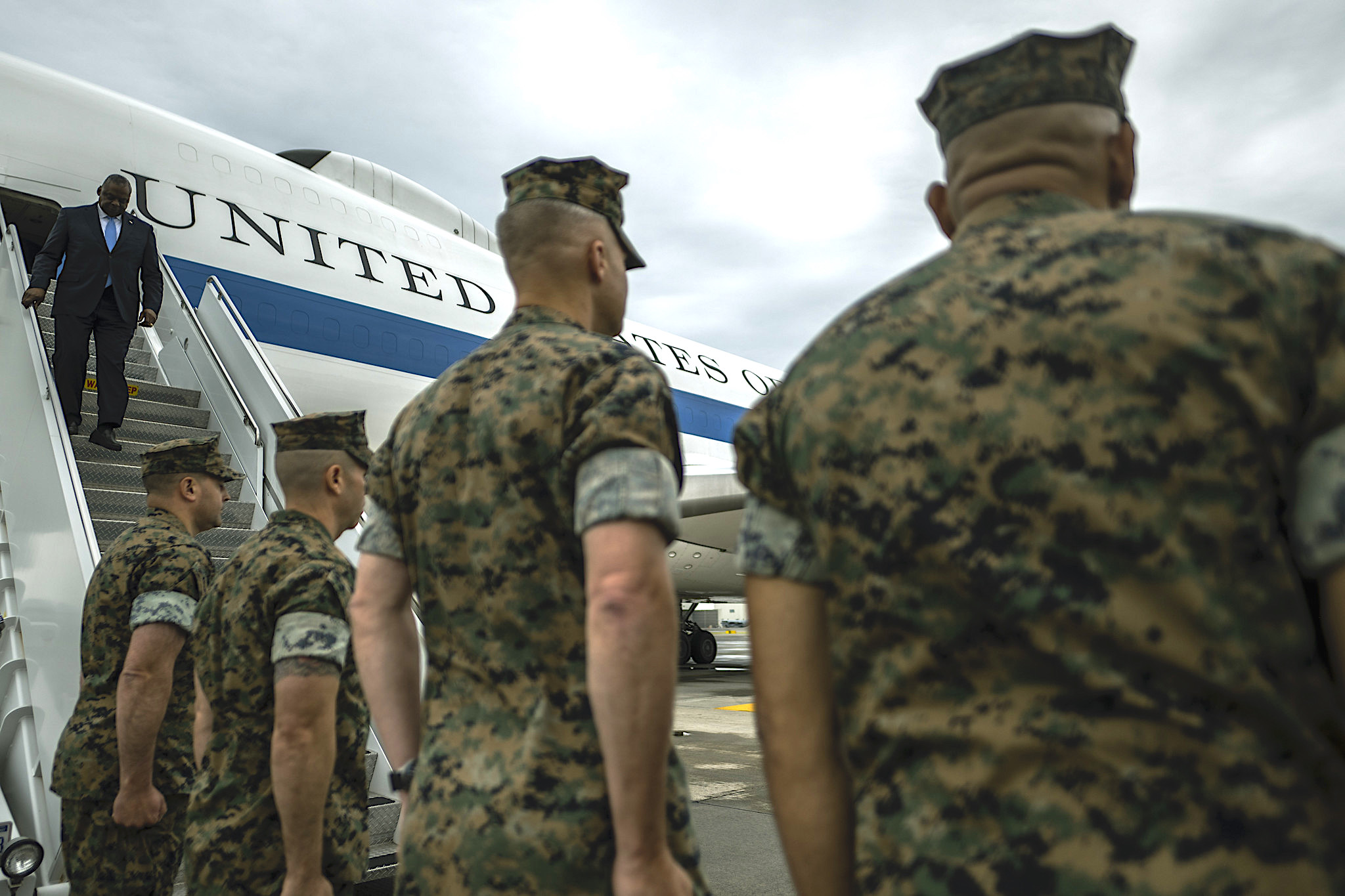China’s defense minister has made it clear that his government is open to dialogue with Washington, writes Vijay Prashad. However, he has put forward a precondition – mutual respect.

The Singapore Navy corvette RSS Victory (88) maneuvers in formation with the frigate RSS Intrepid (69) and the U.S. Navy guided-missile destroyer USS Chafee (DDG 90) in preparation for a surface gunnery exercise in 2009 in the South China Sea. (U.S. Navy/Bill Larned)
By Vijay Prashad
Peoples Dispatch
 On June 3, naval vessels from the United States and Canada conducted a joint military exercise in the South China Sea. A Chinese warship, LY 132, overtook the U.S. guided-missile destroyer, USS Chung-Hoon, and sped across its path. The U.S. Indo-Pacific Command released a statement saying that the Chinese ship “executed maneuvers in an unsafe manner.”
On June 3, naval vessels from the United States and Canada conducted a joint military exercise in the South China Sea. A Chinese warship, LY 132, overtook the U.S. guided-missile destroyer, USS Chung-Hoon, and sped across its path. The U.S. Indo-Pacific Command released a statement saying that the Chinese ship “executed maneuvers in an unsafe manner.”
The spokesperson from China’s Ministry of Foreign Affairs, Wang Wenbin, responded that the United States “made provocations first and China responded,” and that the “actions taken by the Chinese military are completely justified, lawful, safe and professional.”
This incident is one of many in these waters, where the United States conducts what it calls Freedom of Navigation (FON) exercises.
These FON actions are given legitimacy by Article 87(1)(a) of the 1982 United Nations Convention on the Laws of the Sea. China is a signatory to the convention, but the United States has refused to ratify it. U.S. warships use the FON argument without legal rights or any United Nations Security Council authorization. The U.S. Freedom of Navigation Program was set up in 1979, before the U.N. convention and separate from it.
Hours after this encounter in the South China Sea, U.S. Defense Secretary Lloyd Austin spoke at the Shangri-La Dialogue in Singapore. The Shangri-La Dialogue, which has taken place annually at the Shangri-La Hotel since 2002, brings together military chiefs from around Asia with guests from countries such as the United States.

U.S. Secretary of Defense Lloyd Austin addressing the International Institute for Strategic Studies’ Shangri-La Dialogue in Singapore on June 3. (DoD/Chad J. McNeeley)
At a press gaggle, Austin was asked about the recent incident. He called upon the Chinese government “to reign in that kind of conduct because I think accidents can happen that could cause things to spiral out of control.”
That the incident occurred place because a U.S. and Canadian military exercise took place adjacent to Chinese territorial waters did not evoke any comment from Austin. He emphasized the role of the United States to ensure that any country can “sail the seas and fly the skies in international space.”
Austin’s pretense of innocence was challenged by his Chinese counterpart, Defense Minister Li Shangfu. “Why did all these incidents happen in areas near China,” Li asked, “not in areas near other countries?” He continued:
“The best way to prevent this from happening is that military vessels and aircraft not come close to our waters and airspace… Watch out for your own territorial waters and airspace, then there will not be any problems.”
Li contested the idea that the U.S. Navy and Air Force are merely conducting FON exercises. “They are not here for innocent passage,” he said. “They are here for provocation.”

China’s Minister of National Defence Li Shangfu in Moscow on April 16, 2023, during meeting with Russian President Vladimir Putin and Russian Defence Minister Sergei Shoigu. (Pavel Bednyakov, RIA Novosti)
Tighten the Net
When Austin was not talking to the press, he was busy in Singapore strengthening U.S. military alliances whose purpose is to tighten the net around China.
He held two important meetings, the first a U.S.-Japan-Australia trilateral meeting and the second a meeting that included their counterpart from the Philippines. After the trilateral meeting, the ministers released a sharp statement that used words (“destabilizing” and “coercive”) that raised the temperature against China.
Bringing in the Philippines to this dialogue, the U.S. egged on new military cooperation among Canberra, Manila and Tokyo.
This builds on the Japan-Philippines military agreement signed in Tokyo in February, which has Japan pledging funds to the Philippines and the latter allowing the Japanese military to conduct drills in its islands and waters.
It also draws on the Australia-Japan military alliance signed in October 2022, which — while it does not mention China — is focused on a “free and open Indo-Pacific,” a U.S. military phrase that is often used in the context of the FON exercises in and near Chinese waters.
Over the course of the past two decades, the United States has built a series of military alliances against China. The earliest of these alliances is the Quad, set up in 2008 and then revived after a renewed interest from India, in November 2017. The four powers in the Quad are Australia, India, Japan and the United States.

U.S. Secretary of Defense Lloyd Austin arriving at Marine Corps Air Station Iwakuni, Japan, to visit U.S. troops stationed in the country on May 31. (DoD photo by Chad J. McNeeley)
In 2018, the United States military renamed its Pacific Command (set up in 1947) to Indo-Pacific Command and developed an Indo-Pacific Strategy, whose main focus was on China. One of the reasons to rename the process was to draw India into the structure being built by the United States, emphasizing the India-China tensions around the Line of Actual Control.
The document shows how the U.S. has attempted to inflame all conflicts in the region — some small, others large — and put itself forward as the defender of all Asian powers against the “bullying of neighbors.”
Finding solutions to these disagreements is not on the agenda. The emphasis of the Indo-Pacific Strategy is for the U.S. to force China to subordinate itself to a new global alliance against it.
Mutual Respect
During the press gaggle in Singapore, Austin suggested that the Chinese government “should be interested in freedom of navigation as well because without that, I mean, it would affect them.” China is a major commercial power, he said, and “if there are no laws, if there are no rules, things will break down for them very quickly as well.”
China’s Defense Minister Li was very clear that his government was open to a dialogue with the United States, and he worried as well about the “breakdown” of communications between the major powers.
However, Li put forward an important precondition for the dialogue. “Mutual respect,” he said, “should be the foundation of our communications.”
Up to now, there is little evidence — even less in Singapore despite Austin’s jovial attitude — of respect by the United States for the sovereignty of China. The language from Washington gets more and more acrid, even when it pretends to be sweet.
Vijay Prashad is an Indian historian, editor and journalist. He is a writing fellow and chief correspondent at Globetrotter. He is an editor of LeftWord Books and the director of Tricontinental: Institute for Social Research. He is a senior non-resident fellow at Chongyang Institute for Financial Studies, Renmin University of China. He has written more than 20 books, including The Darker Nations and The Poorer Nations. His latest books are Struggle Makes Us Human: Learning from Movements for Socialism and, with Noam Chomsky, The Withdrawal: Iraq, Libya, Afghanistan and the Fragility of U.S. Power.
This article was produced by Globetrotter and was published by Peoples Dispatch.
The views expressed are solely those of the author and may or may not reflect those of Consortium News.
Support CN’s Spring
Fund Drive Today


Note, according to Craig Murray, an expert on maritime law, that it’s only the US who believes international law on freedom of passage extends to military attack groups. Normally, it applies to private and commercial traffic, and any military transit requires an OK from the neighboring country. Note also that the US doesn’t allow unsanctioned foreign military attack groups in its own neighboring waters.
In other words, complete hypocrisy on the US side. As usual.
If it acted like a normal country, it would get more respect.
Yes, Antiwar7:
I agree.The USA has become quite 2 faced in all kinds of laws.While other nations sign agreements, for some reason, the military in America acts as if it can do no wrong. You are doing wrong, America when you act as if RULES are for other nations and not also for the USA.
It appears that a bunch of teenaged brained people are running this nation. Who could forget Victoria Nuland’s “Fuck the EU.” Or Biden acting as if this is the 1940s and America just won WW 2. Actually, if America was closer to Europe, America would no doubt have been bombed to smithereens too.
And too, isn’t it time to focus on so many Americans who have lost jobs and h0mes and a sense of what America now is——-a lover of wars! But guess what America—-BRICS is now here and those nations seem to be getting along and working together.” Every dog has its day,” as the saying goes—-but Biden, Blinken, Nuland and the military—–I think America’s day in the sun is eclipsing—-and maybe the best you can do is act as if other nations matter ( because they do. )
Calling the exercise “Freedom of Navigation” is in itself provocation.
The US does not call exercises off of Camp Pendleton “Freedom of Navigation.” The point is that the US wishes to demonstrate that whenever it wants, it can place military warships close enough to initiate massive strikes on the Chinese mainland. The point is to force Chine to either respond or to stand down. That is the origin of the term itself.
The US is losing the economic basis of empire, with bare force remaining. The rulers are spoiling for a fight, and flailing in many directions. They are building bases in Syria, constraining Australia, bombing and killing across much of Africa, pushing for coup d’etat here and there in South America, throwing money and munitions on the fire in Ukraine (along with more people than we will be told). They blew up the Nordstream pipelines to sink German industry: what other result might have been envisioned?
I won’t say that there is not yet a lot to save. But apparently national finance, industry, and government no longer have much to do with all that.
I’m trying to recall the number of Chinese military bases surrounding the U.S.
How many are required for the U.S to show respect?
Should that be a factor?
No, but let’s be clear, then, about the nature of respect.
I agree that China and Russia should sail through Gibraltar and the English Channel; but I suspect it’s also expensive and they just don’t have the iron fist being the message if push came to shove.
It would, however, expose the hypocrisy, even if the press buried the action.
If nordstream can be blown up with impunity, anything is possible.
If that happened, of course it would be not be buried by the press; it would be turned into a “provocation”. Garnering more support for the Sinophobes and Russophobes. Perhaps even instigating very serious consequences.
This is coming directly from Joe Biden. You don’t mention him.
All of this is being done by the US in service of our headlong foray as global hegemon. It has nothing to do with freedom of navigation. The only place where freedom of navigation is impaired is off the horn of Africa where pirates are operating and the South China Sea where the US is operating.
Washington is motivated by the greed of the gangsters who rule behind the scenes. They care not about the sovereignty of other nations. As long as they are allowed to rule by intimidation and violence, no one is safe.
Mutual respect? Don’t hold your breath, China…The US, as evidenced through many years, respects nobody and nothing.
The country that has an $850 billion dollar “defense” budget, which is larger than the next nine military budgets across the world, is always the country to be sailing and flying instruments of war 5,000 miles from its shores but claiming the other country to be the provocateur.
I am flat out tired of our policeman of the world foreign policy. Somewhere in the past 30 years the United States has morphed from policeman of the world to become the mafia of the world. If we’re going to continue the same policy that’s now in place we should at least rename the Department of Defense to the Department of War.
Maybe, China and Russia should hold military exercises and FON activities off the USA coast. How would that go down ?
A lot of dirty underwear…if you get my drift.
Probably like a “lead balloon”. I’m sure it wouldn’t “float their boat”. LOL
It’d lead to the same kind of hysteria as the recent weather balloon elicited, only worse.